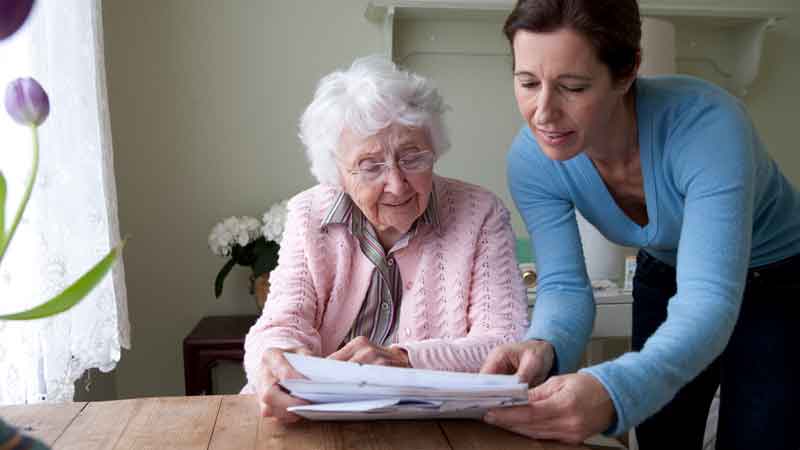Caring for Yourself While Caring for 2 Generations
Setting Healthy Boundaries
Published August 2022
"Sandwich generation" is a term used to describe adults who act as caregivers for their children and their parents at the same time. This can be daunting, but it doesn't have to be.
"Prior to agreeing to be a caregiver, you should consider factors such as what the role will entail or how much time will potentially be needed to fill the role, and if you're actually able to fulfill those requirements," says Alexandra Petrakos, MD, a Northwestern Medicine geriatrician.
Before you take on the responsibilities of being a caregiver for multiple generations, here are some things to consider first.
Communication Is Key
Make sure everyone is on the same page.— Alexandra Petrakos, MD
Outline your expectations and your parents' expectations. This helps establish boundaries, which are essential to a caregiving relationship that is respectful, supportive and caring. During these conversations, be firm, but kind.
"Having guidelines helps the parent know what their adult child's limits are, and it also helps the caregiver know what their parents' limits are. It's a great way to make sure everyone is on the same page," says Dr. Petrakos.
If you have to say no to your parents, that's OK. "If you approach saying no from a position of love and care, rather than frustration and resentment, your parents are more likely to be understanding of that," says Dr. Petrakos. "Then it's an opportunity to brainstorm an alternative solution."
After establishing and communicating your boundaries and your parents' boundaries, everyone should respect them. When someone crosses a boundary, speak up. Here are ways to address your loved one when this happens:
- Have a conversation. Restate your boundary firmly, and clearly communicate any consequences. If it happens again, follow through on that consequence.
- Give space. Consider asking other family members for help, enrolling your loved ones in an adult social program, such as community gardening, or hiring in-home caregivers.
- Seek professional help. A mental health professional can offer support on how to address difficult conversations, as well as guidance on what healthy boundaries should look like.
Protect Your Health and Well-Being
Caring for yourself is one of the most important things you can do as a caregiver.
"You can only be a good, effective and safe caregiver if you have your own health intact first," Dr. Petrakos says. She suggests these tips for self-care:
- Get regular physical activity. Moderate exercise can boost your energy level. Something as simple as going for a walk around the neighborhood can reduce stress and improve your mood.
- Maintain a healthy diet. What you eat impacts your physical and mental health. When you eat healthy, you reduce your chances of developing health issues, such as diabetes or heart disease.
- Take care of business. Financial well-being is a part of self-care. Staying on top of your finances can help you avoid additional stress.
- Make time for yourself. Enjoy what makes you happy. Whether it's catching up on a new TV series or reading a book, engaging in activities that bring you delight can help you relax.
- Join a support group. Caregiver support groups can be a resource for connecting with people in similar situations. They may have helpful suggestions and offer a sense of community.
Involve Your Children
If you feel overextended, ask your children for help with age-appropriate caregiving tasks. This can help strengthen bonds between you, your parents and your children. However, remember that caring for older adults can take away time and attention from your children, no matter their age. Make time to do something one-on-one with your child, like a movie night or playing a game.
Know When to Change Course
At some point, you may need to re-evaluate your caregiver role, and that's OK. It might be time for a new approach if:
- Caring for your parents is contributing to any health issues you have
- You're unable to manage your own health
- You're spending so much time caring for your parents that you're unable to care for or support other family members, such as your children or spouse






